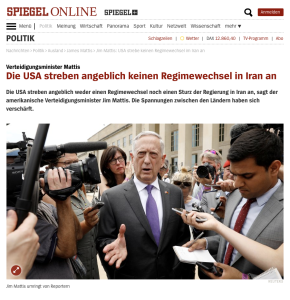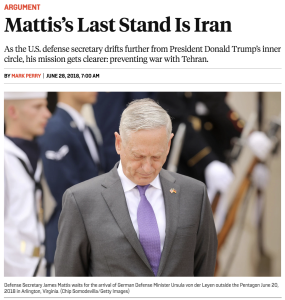Washington plans a coup in Iran
Deployment of a nuclear-capable US fleet in the Mediterranean Sea speaks a clear language, too.
The Islamic revolution in Iran would not have been possible without US support: Its leader Ayatollah Khomeini would never have made it into the flight from Paris to Tehran without CIA consent. This costly decision came under pressure: Had Khomeini not stepped in, a communist takeover was the likely alternative – and to Washington: anathema. But Khomeini never planned to become Washington’s errand boy and brazenly took apart the very commanding system, which Washington had installed in Tehran: a huge embassy compound covering a full block, from where all important Shah decisions were prepared and controlled. Whosoever wants to see an apparatus like that at work today, may visit Kabul; similar set-up, same function and, sorry to say: same systemic failure. This type of US-installed foreign shadow government in Tehran had to be abolished, if Khomeini wanted to stand a chance – and he certainly wasted little time.
After 1979 Iran has weathered the toughest sanctions ever imposed on any country in mankind’s history; and has seen a truly astonishing development in spite of all the huge hurdles put in its way. Since then Iran has fostered its own special brand of shrewd diplomacy mixed with an unparalleled decisiveness in peddling influence in the Middle East.
Not only was Washington, then under President Carter, unable to free the embassy hostages by force; but also the Iraq-Iran war in the eighties, leaving one million soldiers and civilians dead on both sides, failed to shatter the Islamic government. Observers counted 17 countries selling military supplies to fuel the conflict, 13 of them delivering to both sides, including: Israel! Judging from today, this ruthlessness was maybe the biggest single miscalculation, costing the west its influence in this part of the world, which seems fair enough: Both parties to the war could not avoid noticing, that to the utter satisfaction of grey eminences operating in and into Washington, Muslims were mass killing Muslims, without any measurable benefit except for global competitors. Iraqi leader Saddam Hussein later proved unable to heed all the lessons involved, which cost him his life. But Tehran’s sophisticated ruling system did – and the country gained strength and allies. Not least by taking part in Pakistan’s nuclear „Ummah bomb“ scheme – and the CIA understandably doesn’t appreciate countries turning her dirty tricks against her masters…
Tehran’s successes come at a price. Wherever Washington pushes strongly for regime change, inner peace and stability suffer, with economy and rule of law bearing the brunt of the burden. Venezuela is a victim, president Maduro and his supporters fighting valiantly, as is all of South America, with Hugo Chavez‘ legacy at the top of disaster: the Alba group of countries. By the way: Those countries, who indulge in this mix of illegal economic cum clandestine subversive attacks, suffer as well, in a kind of backlash; the recent Russian example teaching Europe an expensive lesson.
Ever since 1979, the US, in its multi-pronged subversion strategy, used four main ways to destabilize Iran: open and secret military operations – including „black ops“ and occasional assassination of important nuclear scientists; sponsorship of more „classic“ terrorism, with two types involved: political, like Mudshahedin-e-Khalq (MEK), and ethnic: the Jundallah-type system of Belutchistan-based fighters working on both sides of the Iran-Pakistan border, or Kurdish and other groups‘ unrest. Iran as a multi-ethnic country has a weak spot here, Washington learned from the war in the eighties to make sure: Kurdish support to Tehran was challenged ever since; last not least: Iranian business and family connections worldwide.
What is certainly a new development in Washington’s traditional not-so-covert warfare against Iran, is the recent „political upgrading“ of the MEK terror group, which was listed as such in the US until 2012 (!). On this background, MEK’s latest huge gathering of 25’000 followers on June 30, 2018 in Villepinte close to Paris, marked an important milestone. NATO is now getting involved, adding momentum to her campaign to subdue Iran: France acts as traditional MEK party host, Germany pushes ahead by picking an Iranian diplomat accredited in Austria’s Vienna off a German autobahn rest area, under the suspicion/pretext, to have fostered a terror attack against the above mentioned Villepinte meeting – a very unlikely adventure for the contemporary Iranian style of politics. The story sounds more like a secret service plot to disturb the EU’s effort to keep the nuclear agreement (JCPoA) going. But this all is nothing compared the involvement of Trump’s National Security Advisor, John Bolton; he not only is known for fruitlessly kicking a hotel room’s door of a lady at night, whom he had pushed in vain the same evening to sign an accord on a business matter. In March 2015, when the 5+1 group of countries struggled to fix the much-attacked historical nuclear deal, Bolton wrote an OP-ed article in the New York Times entitled: „To stop Iran’s bomb, bomb Iran“. Later, July 1st, 2017, as paid guest speaker on another big MEK event, Bolton openly and in no unclear words supported a coup in Iran with the help of MEK; to thunderous applause, since MEK was founded in 1965 by the CIA to oust the Shah, but could not benefit when that happened in 1979.
Since his inauguration as (in)security advisor, last April 9, 2018, Bolton has considerably scaled down his rhetorics, but suspicion lingers. To be clear, Washington works with scenarios, which is what every professional organization does, in politics as in business; the question is: Will Washington really pull through this time? And what if the whole effort leads to war?
The answer is and must be multi-pronged, analyzing medium term developments: In a similar situation in November 2013, when Iran was successfully pursuing its peaceful nuclear program, the 5+1 group of countries signed the „Joint Plan of Action“ (JPoA), an interim agreement, which gave the final contract its name in July 2015. But at that time, Barack Hussein Obama was US president – and he successfully withstood Tel Aviv’s and US-based lobby pushes against this historical deal with support of his whole cabinet plus all European allies. Russia’s military involvement in Syria only started end September 2015.
A weak point in the western perspective was and is always, that to all important restraints imposed on Iran in the JCPoA, there were time frames, which were certain to need re-negotiation one day, normally in the early twenties.
But now the overall and global situation has greatly changed, to the clear disadvantage of Washington, NATO and the west as a whole – most importantly: The US has lost its secure overall military dominance over Russia, which has deepened its ties with China in all matters of commune interest. 2’000 US and other NATO members‘ troops plus inofficial units in Syria are being under multilateral debate: Washington cannot but acknowledge, that its presence lacks invitation from Damascus, thus making even a minimum deal: a parallel withdrawal of US, French etc. forces on one side and Iranian on the other – highly unlikely. In addition to that, the global financial system is unhinged, crash imminent, war the likely way out – more than ever.
Two more important fields need come into focus here: The internal political situation in the US – and Russian security parameters. The aftermath of the first US-Russia summit shows: Trump, presiding over a largely anti-Iranian cabinet, has a problem to cling to his Helsinki statements, namely, that Russia was not involved in any influencing of the last US presidential election in 2016. Trump’s refusal to ask for Russian „withdrawal“ from the Crimea peninsula in the joint press conference in Helsinki, was recently „corrected“ by US Secretary of State, Michael Pompeo. Both Trump standpoints deserve merit: The biggest danger of influencing US elections lies in the US voting system involving 95% of the vote cast electronically – plus nationwide use of a software that allows fine-tuned manipulation of all inputs into several desired directions. The Crimea issue is crystal clear: After a referendum on access to Russia with more than 90% voter participation, with more than 90% signing in favor of re-unification, Moscow cannot simply „withdraw“: Even voicing the idea is dishonest, treasonous, illegal, impractical and therefore: improbable. This is clear now, even in the reality-abhorring west, making the whole argument a „fake debate“, a pretext. A pretext for aggression against Russia. And now the acting US president stands under blackmail unprecedented in recent US history: The affairs around his former legal council Micael Cohen stir huge waves, with impeachment always looming around the corner. Who can be sure, Trump will/can hold his end in this unequal fight? US defense secretary James („Mad Dog“) Mattis claimed last Friday, that the US had no plans to trigger a coup in Iran, let alone war, wearing crossed US-German flags attached to his lapel – on two different occasions. He was taken for his word only in Germany.
The New York Times keeps silent about Mattis, but is running a lengthy article on many politically juicy details of Washington’s top level interference in Egypt’s regime change from Mursi to Al-Sisi. „Foreign Policy“ gives Mattis a very different spin, showing his very same lapel decoration as German Spiegel, but making it brutally clear: „Mattis’s last stand is Iran“. Before stepping down? Being ousted? Who is being threatened here? Iran? Mattis? Both?
On August 4, the toughest US sanctions in Iran’s history are to become effective – in addition to the presently more than 80 US military installations surrounding the country. Is this the usual blackmail type of US foreign policy to coerce Tehran into submission? Success appears very unlikely: Washington’s outlines of a new „deal“, a much tougher JCPoA, were so demonstratively unattractive; Washington would be deeply surprised, many angered, if Tehran suddenly agreed. This reminds the observer of the last ditch US „effort“ in 2003, which was duly and expectedly repudiated by Saddam Hussein – and then the massacre started by a criminal „coalition of the willing“.
Come Russian security needs: A coup against the Iranian partners may change the situation in the Middle East completely, roll back US losses of the last 20 years, which makes it so utterly attractive in the eyes of those, who do not, or at least pretend not to, understand the underlying (deep state?) master plans. Already NATO feels being forced to enlarge the Afghanistan force – a highly precarious issue. Russia cannot afford to lose any of its partners, not Syria, for the Mediterranean bases, Hmeimim and Tartus, which are regarded some as a guarantee for Europe’s enhanced political moving space; not Tehran, with multiple much-needed advantages – and hopefully not the rapprochement with Turkey’s courageous president Erdogan. Chances of winning more support from Europe to peacefully and fairly settle shared European problems may dwindle, should Moscow retreat – not to speak about the fact, that losing allies consequently means, that the fight will take place in one’s own country, without foreign stepping stones granting political and military maneuverability. Yes, this much is certain: After Iran comes Syria, the hitherto valid order may well be reversed – but after that, quite certainly: Russia. And yet another perspective needs introduction here: Should ever, ever a European country decide to go it the Erdogan way, or – for once dreams may be allowed – employ a time-proven strategy and conclude a Bismarck-style reinsurance treaty with Russia, which is perfectly legal even for NATO members: a well-based reputation is the way to foster these solutions: of Russia’s intelligent flexibility and reliability. Both – and at the same time.
To cut the long story short: If Russia makes it unambiguously clear, that triggering a coup in Iran (as in Syria), let alone prepare or start a war, will not be accepted and countered without delay and painfully, will give the beleaguered US president the much-needed breathing space at home; and all others: increased security. Americans want their boys and girls back home – and Trump had promised exactly this. Washington will think twice if stiff opposition comes up. Tehran is known to stick to its commitments; it will try – but not insist – on using the situation for undue unilateral gains. Being tough now may stop the unraveling of global security and peace at an early stage.
Original: http://inforos.ru/en/?module=news&action=view&id=72639




